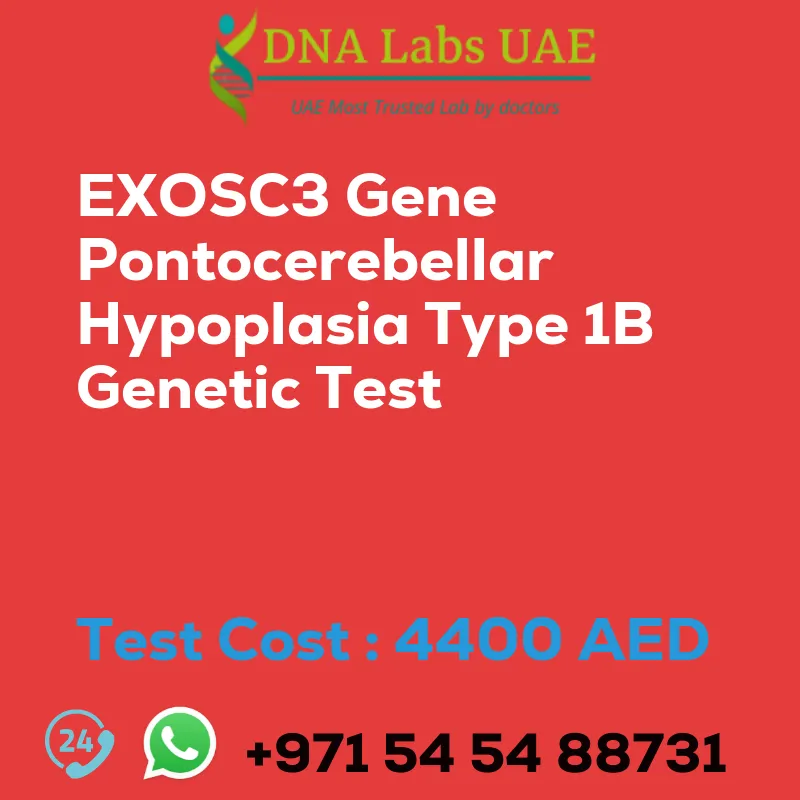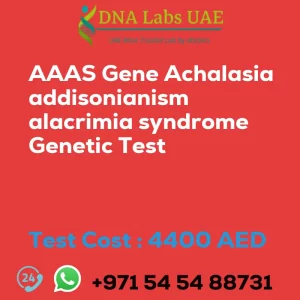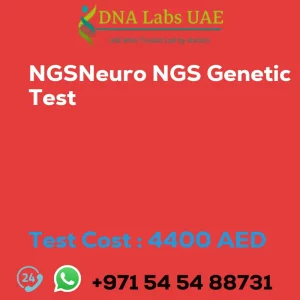EXOSC3 Gene Pontocerebellar Hypoplasia Type 1B Genetic Test
Welcome to DNA Labs UAE, your trusted genetic testing laboratory in the UAE. Today, we will be discussing the EXOSC3 Gene Pontocerebellar Hypoplasia Type 1B Genetic Test.
Test Name: EXOSC3 Gene Pontocerebellar Hypoplasia Type 1B Genetic Test
Components:
- Price: 4400.0 AED
- Sample Condition: Blood or Extracted DNA or One drop Blood on FTA Card
- Report Delivery: 3 to 4 Weeks
- Method: NGS Technology
- Test Type: Neurological Disorders
- Doctor: Neurologist
- Test Department: Genetics
Pre Test Information:
Before undergoing the EXOSC3 Gene Pontocerebellar Hypoplasia Type 1B NGS Genetic DNA Test, it is important to provide the clinical history of the patient. Additionally, a genetic counseling session will be conducted to draw a pedigree chart of family members affected with EXOSC3 Gene Pontocerebellar Hypoplasia Type 1B.
Test Details:
The EXOSC3 gene is associated with a genetic disorder called pontocerebellar hypoplasia type 1B (PCH1B). This disorder affects the development of the brain, particularly the cerebellum and the pons. Individuals with PCH1B typically have delayed development, intellectual disability, problems with movement and coordination, and may also experience seizures.
NGS (Next-Generation Sequencing) genetic testing is a type of genetic testing that allows for the simultaneous analysis of multiple genes or even the entire genome. In the case of PCH1B, NGS genetic testing can be used to identify mutations or variations in the EXOSC3 gene that may be causing the disorder. By analyzing the DNA sequence of the EXOSC3 gene, NGS testing can help confirm a diagnosis of PCH1B in individuals with symptoms consistent with the disorder. It can also be used for carrier testing in families with a known history of PCH1B, allowing for early detection and family planning.
It’s important to note that genetic testing should always be performed and interpreted by qualified healthcare professionals, such as genetic counselors or geneticists, who can provide appropriate guidance and support.
| Test Name | EXOSC3 Gene Pontocerebellar hypoplasia type 1B Genetic Test |
|---|---|
| Components | |
| Price | 4400.0 AED |
| Sample Condition | Blood or Extracted DNA or One drop Blood on FTA Card o |
| Report Delivery | 3 to 4 Weeks |
| Method | NGS Technology |
| Test type | Neurological Disorders |
| Doctor | Neurologist |
| Test Department: | Genetics |
| Pre Test Information | Clinical History of Patient who is going for EXOSC3 Gene Pontocerebellar hypoplasia type 1B NGS Genetic DNA Test A Genetic Counselling session to draw a pedigree chart of family members affected with EXOSC3 Gene Pontocerebellar hypoplasia type 1B |
| Test Details |
The EXOSC3 gene is associated with a genetic disorder called pontocerebellar hypoplasia type 1B (PCH1B). This disorder affects the development of the brain, particularly the cerebellum and the pons. Individuals with PCH1B typically have delayed development, intellectual disability, problems with movement and coordination, and may also experience seizures. NGS (Next-Generation Sequencing) genetic testing is a type of genetic testing that allows for the simultaneous analysis of multiple genes or even the entire genome. In the case of PCH1B, NGS genetic testing can be used to identify mutations or variations in the EXOSC3 gene that may be causing the disorder. By analyzing the DNA sequence of the EXOSC3 gene, NGS testing can help confirm a diagnosis of PCH1B in individuals with symptoms consistent with the disorder. It can also be used for carrier testing in families with a known history of PCH1B, allowing for early detection and family planning. It’s important to note that genetic testing should always be performed and interpreted by qualified healthcare professionals, such as genetic counselors or geneticists, who can provide appropriate guidance and support. |








